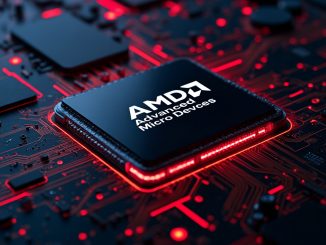
Advanced Micro Devices Inc. (AMD) experienced a significant drop in its stock price on Wednesday, falling by as much as 10% after the company announced its fourth-quarter revenue forecast. The chipmaker projected $7.5 billion in sales, which fell slightly short of Wall Street’s expectations of $7.55 billion. This shortfall raised concerns about the growth trajectory of AMD’s artificial intelligence (AI) sales, particularly when compared to the expectations set by both analysts and investors.
Despite the disappointment, AMD’s advancements in the AI sector are notable. The company has revised its sales expectations for AI accelerators upwards to over $5 billion for the year, an increase from the earlier $4.5 billion forecast. However, this growth, while impressive, is overshadowed by Nvidia’s (NVDA) dominance in the market, where sales in the same segment reach into the tens of billions.
During a post-earnings conference call, AMD’s CEO Lisa Su addressed these concerns head-on, emphasizing the company’s efforts to expand in the AI market. Su highlighted that AMD is making significant inroads with major data center companies, gaining their trust and business opportunities. “Customers are very, very open to AMD,” she remarked, underscoring the company’s competitive positioning.
AMD’s third-quarter performance, however, was a bright spot with an 18% revenue increase to $6.82 billion, surpassing the anticipated $6.71 billion. Net income reached $771 million, with earnings per share at $0.47—a 161% rise from the same quarter last year. This growth was fueled by robust sales in their data center and PC chip segments.
The company’s MI300 accelerator chips are becoming a critical component of AMD’s strategy to challenge Nvidia in the AI hardware space. Yet, supply chain constraints continue to be a bottleneck. AMD relies on outsourcing its manufacturing, mainly to Taiwan Semiconductor Manufacturing Co. (TSM), which limits its ability to scale production rapidly in response to high demand.
Looking forward, AMD is optimistic about its supply chain improvements and expects significant growth into 2025. However, the immediate concern for investors remains the pace of AI adoption and the return on investment for AI hardware. AMD not only competes with Nvidia in AI and graphics for gaming but also with Intel in the broader processor market for PCs and servers.
While the data center and PC segments show strength, AMD’s custom processor division for gaming consoles has seen a decline, reflecting the lifecycle stage of current console generations.
AMD’s ability to navigate these challenges will be crucial as it continues to compete in the high-stakes, rapidly evolving tech landscape where AI dominance is becoming increasingly central to market leadership.
Price Action
AMD shares were trading down by 10.08% at $149.48 at the time of publication Wednesday. The $269 billion market cap name is up less than 2% year-to-date and 38.36% year-over-year.





Leave a Reply